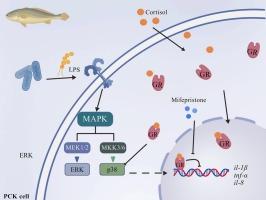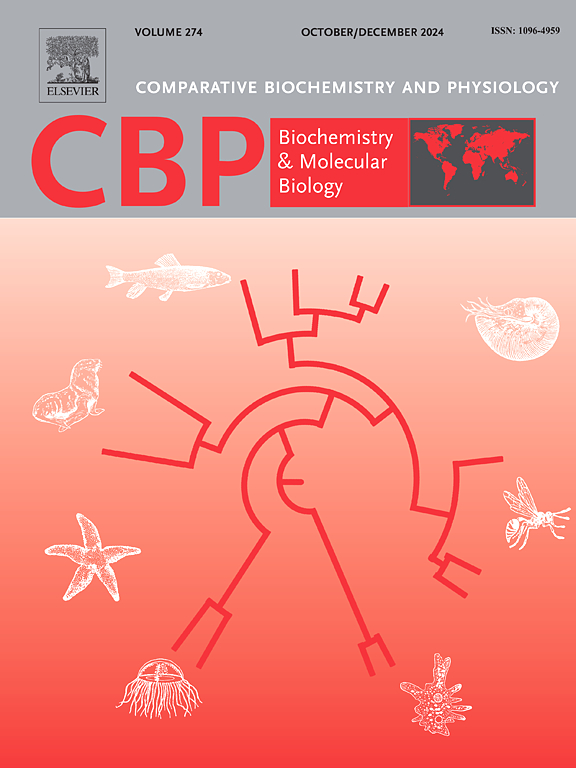Cortisol suppresses lipopolysaccharide-induced in vitro inflammatory response of large yellow croaker (Larimichthys crocea) via the glucocorticoid receptor and p38 mitogen-activated protein kinase pathways
IF 1.9
3区 生物学
Q4 BIOCHEMISTRY & MOLECULAR BIOLOGY
Comparative Biochemistry and Physiology B-Biochemistry & Molecular Biology
Pub Date : 2024-11-13
DOI:10.1016/j.cbpb.2024.111046
引用次数: 0
Abstract
Glucocorticoids (GCs) are well-established anti-inflammatory agents, with cortisol, an endogenous GC, exerting pivotal regulatory effects on normal physiological processes. However, the immune regulatory role of cortisol in teleost fish, particularly in inflammation induced by pathogenic infection, remains largely unexplored. Here, we revealed that lipopolysaccharide (LPS) triggers a pro-inflammatory response in the large yellow croaker (Larimichthys crocea), as evidenced by increased expression of key pro-inflammatory cytokines and activation of the mitogen-activated protein kinase (MAPK) signaling pathway. We further explored the immunosuppressive capacity of cortisol in LPS-stimulated large yellow croaker kidney cells (PCK cells) and in vitro tissues of the large yellow croaker. Our findings indicated that cortisol effectively suppresses LPS-induced overexpression of pro-inflammatory cytokines and p38 MAPK pathway activation. Moreover, the immunosuppressive effects of cortisol were reversed by pretreatment with mifepristone, a glucocorticoid receptor (GR) antagonist. Collectively, this study delineated the inhibitory role of cortisol in the LPS-induced inflammatory cascade in large yellow croaker and underscores the significance of GR in mediating this response. These insights advance our comprehension of GCs-mediated immune modulation and provide a theoretical basis for the application of cortisol in disease prevention and the selective breeding of disease-resistant traits in aquaculture.

皮质醇通过糖皮质激素受体和 p38 丝裂原活化蛋白激酶途径抑制脂多糖诱导的大黄鱼体外炎症反应。
糖皮质激素(GCs)是公认的抗炎药物,其中皮质醇是一种内源性 GC,对正常生理过程具有关键的调节作用。然而,皮质醇在远洋鱼类中的免疫调节作用,尤其是在病原体感染诱导的炎症中的作用,在很大程度上仍未得到探索。在这里,我们发现脂多糖(LPS)会引发大黄鱼(Larimichthys crocea)的促炎症反应,表现为主要促炎症细胞因子的表达增加和丝裂原活化蛋白激酶(MAPK)信号通路的激活。我们进一步探讨了皮质醇在 LPS 刺激的大黄鱼肾细胞(PCK 细胞)和大黄鱼体外组织中的免疫抑制能力。我们的研究结果表明,皮质醇能有效抑制 LPS 诱导的促炎细胞因子过表达和 p38 MAPK 通路的激活。此外,使用糖皮质激素受体(GR)拮抗剂米非司酮进行预处理可逆转皮质醇的免疫抑制作用。总之,这项研究阐明了皮质醇在 LPS 诱导的大黄鱼炎症级联反应中的抑制作用,并强调了 GR 在介导这种反应中的重要作用。这些见解加深了我们对 GCs 介导的免疫调节的理解,并为皮质醇在水产养殖疾病预防和抗病特性选择性育种中的应用提供了理论依据。
本文章由计算机程序翻译,如有差异,请以英文原文为准。
求助全文
约1分钟内获得全文
求助全文
来源期刊
CiteScore
4.60
自引率
4.50%
发文量
77
审稿时长
22 days
期刊介绍:
Comparative Biochemistry & Physiology (CBP) publishes papers in comparative, environmental and evolutionary physiology.
Part B: Biochemical and Molecular Biology (CBPB), focuses on biochemical physiology, primarily bioenergetics/energy metabolism, cell biology, cellular stress responses, enzymology, intermediary metabolism, macromolecular structure and function, gene regulation, evolutionary genetics. Most studies focus on biochemical or molecular analyses that have clear ramifications for physiological processes.

 求助内容:
求助内容: 应助结果提醒方式:
应助结果提醒方式:


